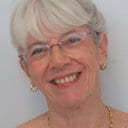“I stumbled upon the stumpers work primarily because it’s riddles, and I’m a riddle lover.”
An int erview with Maya Bar-Hillel, PhD
erview with Maya Bar-Hillel, PhD
Professor Emeritus, Psychology, Hebrew University of Jerusalem
By: Michelle Johnson (11/1/19)
Had you always thought of going into the field of psychology?
I had hoped to be a mathematician, but at the Hebrew University where I got my education, it was obligatory to sign up for two departments. We don’t sign up for general education and then choose a major in sophomore year. You register straight ahead to the department, like signing up for law school or medical school. I wanted to sign up for the math department, but it was obligatory to sign up for two, and I chose psychology primarily because I had no idea what it was.
My great passion was mathematics, but then as the years went by I realized that [although] I could be a good student of mathematics, I could not be a producer of mathematics. I didn’t have what it takes to be a mathematician. And in the years when I found out what psychology was about, it became increasingly more attractive and also something that I thought I could do. So no, it wasn’t something I meant to do all my life. It was almost a default, or it was almost like I stumbled into it because my real passion was beyond my actual mental powers.
How did you come to studying your current topic of interest?
I look at these riddles that I call “stumpers.” It’s not the case that I have built some expertise and I’m digging deeper and deeper in a field I’ve been in for decades, not at all. It’s completely out of my field and it’s not a continuation of anything I’ve done before. I stumbled upon the stumpers work primarily because it’s riddles, and I’m a riddle lover. It’s new in my life, and this particular class of riddles has no history in psychology. Nobody’s ever looked at stumpers before. So where does it come from? It comes from the fact that a retired professor happened to like riddles and thought “Wouldn’t it be neat to combine my affection for riddles with my background and research and find a way of bringing them together.”
Does studying riddles involve other fields, like linguistics?
Riddles, or stumpers, certainly have this element that words play an important role. There’s a whole different class of stumpers that don’t depend on the wrong visualization. They depend on the wrong linguistic interpretation. I’ll give you an example: a boat is full of people and there’s not a single person on it. How can that be? If you see a picture in your mind of a boat full of people and you don’t understand, how there’s not a single person on it, it’s not going to help you to change the picture. It’s not going to help you to see the boat without anybody on it. But there is a word in what I said there’s not a single person on it. There’s not a single person because they’re all married! This is not about a picture; you could see the boat full of people, and you don’t see if they’re single or married. This stumper depends not on changing the picture, but in changing how you understand the word “single.”
What advice might you have for early career researchers trying to carve their own path?
Follow your passion. I’m not sure it’s good professional advice because possibly the better advice is to follow the trends—the trends get funded more easily. It’s not clear that if you follow your passions, if they’re not shared by others, who will pay for them and who will hire you. But I think if you want to have fun in your academic life, I would say follow your passions and with some luck it’ll work out for you. Alternatively, follow what your advisor’s telling you to follow or follow what’s trendy. It’s safer. It might not be quite as exciting, but that’s a way to make a living doing it.
To learn more about Dr. Bar-Hillel and her work, click here.

Maya was my councilor in the youth movement in Israel when I was a girl. I loved her then! She was a role model to is girls. How wonderful to read about her accomplishments.
Naomi L. Nakao, MD
Used to be Naomi Low…